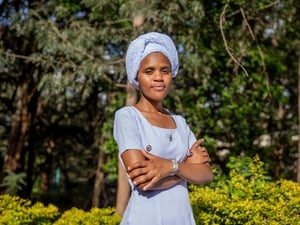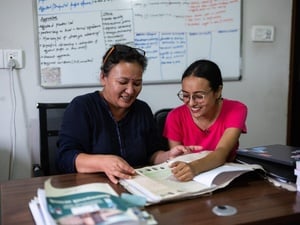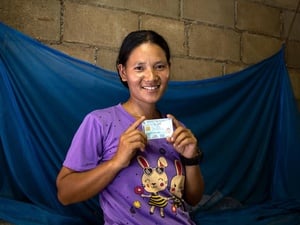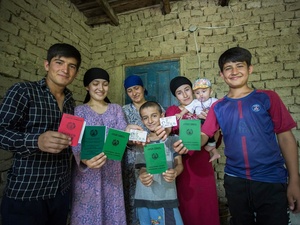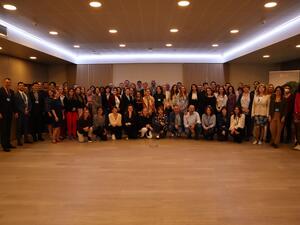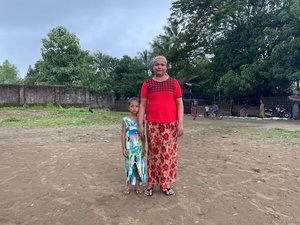First anniversary of the Abidjan Declaration on the eradication of statelessness
First anniversary of the Abidjan Declaration on the eradication of statelessness
Some 22,000 people acquired identity documents in West Africa in past year
West Africa is celebrating today the first anniversary of the Abidjan Declaration on the eradication of statelessness. The Declaration, adopted on 25 February 2015 by the Member States of the Economic Community of West African States (ECOWAS) on the occasion of a ministerial conference organized by the United Nations High Commissioner and ECOWAS, contains 25 commitments. It underlines, among other things, the vital need for the States to ensure that everyone within the region has a recognized nationality.
Around one million people are stateless or at risk of statelessness in West Africa. Lacking identification documents, they have limited access to education, healthcare, employment and land. They are also more exposed to discrimination and abuse because they are not recognized in the eyes of the law.
"We celebrate the progress made in several countries since the adoption of the Declaration last year, as thousands of people who, until now, did not have a determined nationality, will come out of the shadows. Thanks to the advanced legislative and administrative reforms currently being implemented in several States in West Africa, these men, women and children will finally be able to obtain a legal identity", declared Liz Ahua, Regional Representative of UNHCR for West Africa in Dakar. "The Abidjan Declaration is a pioneered moment in the global fight to eradicate statelessness not only in the region but also worldwide. We hope that it will inspire other countries and regions in the world to change their nationality laws so all can enjoy a proper identity hence exercice their rights".
One year after the adoption of the Declaration, several States have taken concrete measures to fight the scourge of statelessness. Côte d'Ivoire, for instance, adopted a special law allowing a certain group of people, including stateless people, to acquire Ivoirian nationality by declaration*. This law has enabled more than 123,000 people, including stateless ones, to submit their applications to the Ivorian authorities. Today, at least 6,400 people have already acquired documents confirming their nationality, while 6,000 others have received late birth certificates, which constitutes an important step towards confirming their nationality.
"Thousands of children in West African, such as street children, are not declared at birth and therefore do not have any proof of their identity. They are stateless or at risk of statelessness, which puts them in situations of extreme vulnerability. They can be easily exploited by human traffickers or forced to work", explains Emmanuelle Mitte, who oversees the statelessness section at UNHCR's Regional Representation for West Africa.
"To date, nine States in the region, working with civil society, have elaborated action plans to eradicate statelessness.** They have already been approved at ministerial level in Benin and Gambia. This represents a fundamental commitment to ensure that these children, among others, obtain a nationality".
In Benin, the Government has adopted an action plan to eradicate statelessness. Some 1,730 birth certificates were recently distributed to populations at risk of statelessness in the disputed area of Kourou Koualou, which is claimed by both Burkina Faso and Benin. In Mali, over 7,800 late birth certificates were distributed last year to children of Mauritanian parents in the southern region of Kai. Guinea, Burkina Faso, Liberia and Togo have also announced the revision of their nationality laws. Senegal is working on the elaboration of a children's Act which would contain guarantees against statelessness at birth.
Nine out of the fifteen ECOWAS States are party to the 1954 Convention on the status of stateless persons,*** and eight are party to the 1961 Convention on the reduction of statelessness****. Five other States firmly committed themselves to the fight against statelessness since the adoption of the Abidjan Declaration. Indeed, in December 2015, the Malian Parliament approved the accession to the two Conventions, just as Guinea-Bissau had done several months prior. The Governments of Sierra Leone and Ghana have approved draft text with a view to acceding to the Conventions. The Ministry of Justice of Burkina Faso is working towards the same objective.
In addition, 14 countries have officially nominated focal points for questions relating to statelessness in order to strengthen the coordination of governmental actions in the fight against of statelessness. Around 10 million people are stateless or at risk of statelessness in the world and fall under UNHCR's mandate.
* The declaration is a simplified nationality acquisition mechanism.
** Benin, Gambia, Mali, Senegal, Liberia, Guinea, Guinea Bissau, Ghana, Côte d'Ivoire
*** Benin, Côte d'Ivoire, Gambia, Guinea, Liberia, Niger, Nigeria, Senegal, Burkina Faso
**** Benin, Côte d'Ivoire, Gambia, Guinea, Liberia, Niger, Nigeria, Senegal
Activities planned in Dakar on Thursday 25 February
A panel on statelessness, "One year after the Abidjan Declaration", will be held at the King Fadh Palace on Thursday 25 February at 4:00 pm. It will convene the Minister of Justice of Senegal, Mr. Sidiki Kaba, UNHCR's Deputy Regional Representative Mr. Mathijs le Rutte, UNHCR's expert on statelessness, Ms. Emmanuelle Mitte, and several representatives from civil society. A film on street children in Senegal will be shown during the event, which will close with a press conference. The music group Bideew Bou Bess will perform a song specially written for the fight against statelessness in West Africa, and the artistic group RBS will expose a graffiti mural on the theme of statelessness. Renowned singer Cheick Lo will also be present for the event.
Links
- Support the fight against statelessness: join our campaign #IBelong
- Facebook: UNHCR West Africa
- Twitter: @UNHCRWestAfrica
Videos
Contacts
- Hélène Caux, Senior Regional Public Information Officer, [email protected], tel: + 221 77 333 1291. Twitter: @helenecaux
- Simplice Kpandji, Regional reporting officer, [email protected], tel : + 221 77 333 9883, Twitter: @stplicek
- Emmanuelle Mitte, Senior Protection Officer (statelessness), [email protected], tel : + 221 77 740 14 96


